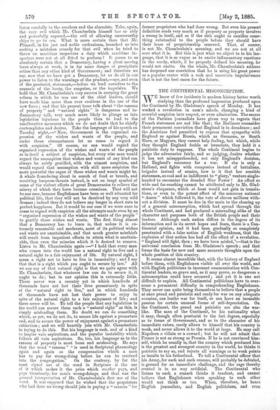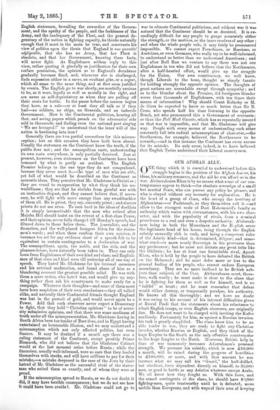THE CONTINENTAL MISCONCEPTION.
WE know of few incidents in modern history better worth studying than the profound impression produced upon the Continent by Mr. Gladstone's speech of Monday. It has worked a revolution in men's minds, changing a kind of scornful suspicion into respect, or even admiration. The sneers of the Parisian journalists have given way to regrets that French statesmen are not like that ; the Berliners reconsider their permanent conviction that England is in decadence ; and the Austrians feel permitted to express that sympathy with England as against Russia, which as Germans, or South Slays, or Magyars, they cannot help feeling, but which, while they thought England feeble or irresolute, they held it a patriotic duty to suppress. The whole Continent begins to judge the adversaries fairly, and so judging, doubts whether it has not misapprehended, not only England's decision, but England's resources for a war. If she is only a Holland, and fights with companies instead of battalions, brigades instead of armies, how is it that her sensible statesmen, so cool and so indifferent to "glory," venture singlehanded to encounter the dreaded Slav Power ? An effect so wide and far-reaching cannot be attributed only to Mr. Gladstone's eloquence, which at least would not gain in translations, or even to the potent effect of the sonorous national " Amen " which followed it, the vote of eleven millions without a division. It must be due in the main to the clearing up of a general misconception, which had spread through the whole Continent, and had produced a misreading alike of the character and purposes both of the British people and their leaders. Although each nation differs in the degree of its information and in its secret hopes and fears, there is a Continental opinion, and it had been gradually so completely penetrated with a false notion of English weakness, that the explosion of that notion has had all the effect of a revelation. "England will fight, then ; we have been misled,"—that is the universal conclusion from Mr. Gladstone's speech ; and that forms the basis for new and more accurate thoughts upon the whole position of this country.
It seems almost incredible that, with the history of England before them, with Englishmen visible all over the world, and with English politicians in incessant communication with Continental leaders, so grave and, as it may prove, so dangerous a misconception could have occurred; and yet it is one not difficult to explain. All Continental politicians have to overcome a permanent difficulty in comprehending Englishmen. They never can quite bring themselves to believe that a people at once proud and patriotic and ready for war on any adequate occasion, can loathe war for itself, or can have an incurable passion for certain unusual forms of self-depreciation. On the Continent, the proud and patriotic are also the warlike. The man of the Continent, be his nationality what it may, though often pessimist to the last degree, especially as to forms of Government, and as to the character of his immediate rulers, rarely allows to himself that his country is weak, and never allows it to the world at large. He may call Napoleon a villain or a coward ; but he will not admit that France is not as strong as Prussia. If he is not convinced himself, which he usually is, that the country which produced him is the greatest and strongest country in the world, he thinks it patriotic to say so, and rejects all warnings as to weak points as insults to his fatherland. To tell a Continental officer that his Army, for such and such reasons, will probably be defeated, is ground for an immediate challenge, and the rage thereby created is in no way artificial. The Continental who listens to such a remark thinks it insolent, and cannot believe that Englishmen when speaking to each other would not think so too. When, therefore, he hears English journalists, and English politicians, and even English statesmen, bewailing the cowardice of the Government, and the apathy of the people, and the feebleness of the Army, and the inadequacy of the Fleet, and the general degeneracy of the nation in fighting capacity, he thinks naturally enough that it must in the main be true, and constructs his view of politics upon the thesis that England is une quantite' negligeable, that she has no Army, that her Fleet is obsolete, and that her Government, knowing these facts, will never fight. As Englishmen seldom reply to this view, rather quoting it gleefully as justification for their own surface pessimism, the opinion as to England's decadence gradually becomes fixed, and, whenever she is challenged, finds expression either in a sneer, an exultant gibe, or a regret, which all come to the same thing, and at first seem justified by events. The English go to war slowly, are morbidly anxious to be, as it were, legally as well as morally in the right, and are never so self-depreciatory as when they are pulling off their coats for battle. In the pause before the cannon begins they have, as a rule—or at least they all talk as if they had—no soldiers, no ships, no Generals, and an imbecile Government. How is the Continental politician, hearing all that, and seeing papers which preach on the adversaries' side sold in thousands, and finding even the national poet singing 'We are betrayed !" to understand that the inner will of the nation is hardening into iron ?
Generally there are two partial correctives for this misconception; but on this occasion they have both been absent. Usually the statesmen on the Continent know the truth, if the public does not ; and the cosmopolitan caste, understanding its own caste everywhere, is only partially deceived. Just at present, however, even statesmen on the Continent have been bemused by what is partly an accident. The English Premier belorgs to the one type they do not comprehend, because they never meet U.—the type of men who are able, yet full of what would be described on the Continent as monastic ideas. They perceive that Mr. Gladstone is Christian ; they are vexed to exasperation by what they think his unworldliness; they see that he shrinks from gainful war with an instinctive disgust, and they cannot believe that, if necessary, he will fight with more energy than any swashbuckler of them all. He is priest, they say, sincerely priest ; and sincere priests do not use arms. To men bred in the ideas of duellists it is simply inconceivable that the Man who retired after Majuba Hill should insist on the retreat of a first-class Power, and their opinion, never fully changed till Monday's speech, had filtered down to those below them. The journalists, and the financiers, and the well-placed loungers listen for the statesmen's words ; and when these confirm their own opinion, it becomes too set for any evidence short of a speech felt to be equivalent in certain contingencies to a declaration of war. The cosmopolitans, again, the noble, and the rich, and the pleasure-lovers, have naturally been taken in. They can only learn from Englishmen of their own kind and class; and Englishmen of that class and kind were till yesterday all of one way of speech. They hated Mr. Gladstone for his internal measures and his external moderation, and found abuse of him as a blundering recreant the greatest possible relief. He was with them a mere orator, who hated war, and would give up anything rather than ask his countrymen to make ready for a campaign. Whatever their thoughts—and some of them must have been suspicious of their own conclusions—they all talked alike, and naturally their Continental friends thought England was lost in the pursuit of gold, and would never again be a Power. Add that such observers never expect a Democracy to fight, that they hold "Christian opinions" to be of necessity submissive opinions, and that there was some modicum of truth under all the misrepresentation, Mr. Gladstone having in South Africa been too tender of Boer lives, and in Egypt having entertained an honourable illusion, and we may understand a misconception which not only affected politics, but even finance. It may be doubted if a month ago there was a ruling statesman of the Continent, except possibly Prince Bismarck, who did not believe that the Gladstone Cabinet would at the last moment retire before Russia ; while the financiers, usually well-informed, were so sure that they loaded themselves with stocks, and will have millions to pay for their mistake,—a mistake deepened in the case of the Jews by their hatred of Mr. Gladstone as the successful rival of the statesman who suited them so exactly, and of whom they were so proud.
If the misconception spread to Russia, as we do not doubt it did, it may have terrible consequences; but we do not see how it could have been avoidet Mr. Gladstone could not go to
war to educate Continental politicians, and without war it was natural that the Continentshould be so deceived. It is exceedingly difficult for any people to gauge accurately either the strength, or the motives, or the inner resolves of any other ; and when the whole people rule, it may fairly be pronounced impossible. We cannot expect Frenchmen, or Russians, or Austrians, or even Germans, who really try to be well-informed, to understand us better than we understand Americans ; and just after Bull Run we venture to say there was not one Englishman in ten who did not believe that the Northerners, after a half-hearted effort, would give up the struggle
for the Union. Our own constituency, we well know, though Liberals to the bone, thought us simply fanatic for holding strongly the opposite opinion. The thoughts of great nations are unreadable except through sympathy ; and as to the blunder about the Premier, did foreigners blunder worse than thousands of Englishmen, with ten times their means of information ? Why should Count Kalnoky or M. de Giors be expected to know so much better than Sir R. Cross, who spends half his time listening to the opposite Bench, vet who pronounced this a Government of recreants ; or than the Pall Mall Gazette, which has so repeatedly assured us that war is impossible, and that Mr. Gladstone will give way. People with every means of understanding each other constantly fall into radical misconceptions of charieter,—the Southerners, for example, believed. the Northerners to be cowards,—and in this instance the Continent has every excuse for its mistake. Its only error, indeed, is to have believed that English Tories understood their Liberal countrymen.



































 Previous page
Previous page